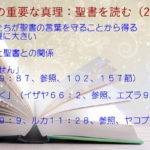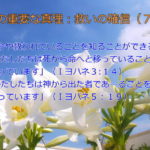
魂、思い(ψυχή<psuché>、διάνοια<dianoia>―マルコ12:30)
【回復訳】 心を尽くし、魂を尽くし、思いを尽くし、力を尽くして、主であるあなたの神を愛しなさい』。
【KG訳】 心をつくし、精神をつくし、思いをつくし、力をつくして、主なるあなたの神を愛せよ』。
【SK訳】 心を尽くし、思いを尽くし、知性を尽くし、力を尽くして、あなたの神である主を愛せよ。』
【SKD訳】 心を尽くし、精神を尽くし、思いを尽くし、力を尽くして、あなたの神である主を愛しなさい。』
ギリシャ語
καὶ ἀγαπήσεις Κύριον τὸν Θεόν σου ἐξ ὅλης τῆς καρδίας σου καὶ ἐξ ὅλης τῆς ψυχῆς σου καὶ ἐξ ὅλης τῆς διανοίας σου καὶ ἐξ ὅλης τῆς ἰσχύος σου.(Nestle 1904)
Strong's Concordance
psuché: breath, the soul
Original Word: ψυχή, ῆς, ἡ
Part of Speech: Noun, Feminine
Transliteration: psuché
Phonetic Spelling: (psoo-khay')
Definition: breath, the soul
Usage: (a) the vital breath, breath of life, (b) the human soul, (c) the soul as the seat of affections and will, (d) the self, (e) a human person, an individual.
Strong's Concordance
dianoia: the mind, disposition, thought
Original Word: διάνοια, ας, ἡ
Part of Speech: Noun, Feminine
Transliteration: dianoia
Phonetic Spelling: (dee-an'-oy-ah)
Definition: the mind, disposition, thought
Usage: understanding, intellect, mind, insight.
解説
『[この節の力は]体力のことを言っています。わたしたちは、わたしたちの心から、魂、思いを経過し、体に至るまで、全存在をもって、わたしたちの神である主を愛します。』(マルコ12:30フットノート2)
『毎回の「……を尽くし」は、文字どおりには、あなたのすべての……から。』(マルコ12:30フットノート1)




























